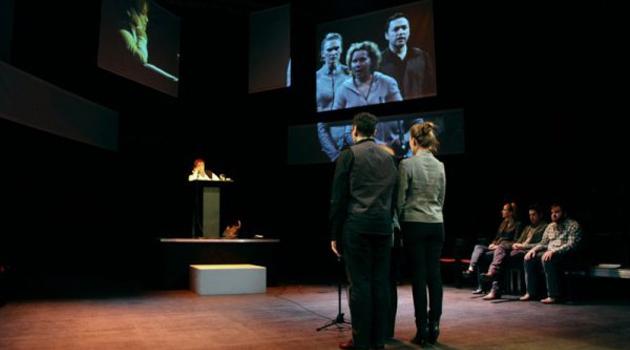Czech Republic: "Slaves of Justice", about Hungarian hate crime trial, performed this Sunday

"Slaves of Justice" is a musical cabaret show based on a 1 200-page transcript of an actual trial and more than 100 hours of testimony, in which 12 laypersons rule on a case from real life. This third documentary project by the PanoDrama group examines the judiciary, with a special emphasis on minorities.
You too can witness the performance this Sunday, 25 May at Divadlo Archa in Prague. In this production, the artists’ center of interest is the moment when a law on hate crime was turned against the members of a minority whom it was actually supposed to protect.
The case occurred in 2009. At a time when Hungary was being shaken by multiple racially-motivated murders of Romani people, around 30 cars carrying members of the neo-Nazi paramilitary Hungarian Guard organization visited a Romani village.
The aim of their visit was to provoke an incident in the emotionally tense atmosphere. Local Roma brutally attacked one of the vehicles using axes, pitchforks, scythes and other farm implements.
They broke through the car’s roof and windows, and it was a miracle that the three Hungarian Guard members inside the car escaped with light injuries only. The assailants were arrested and charged not only with a felony, but with committing that felony against "Hungarians".
Of course, the Romani men involved consider themselves Hungarians as well as Roma. The nine men were recently sentenced to a total of 40 years in prison.
One of those convicted was evidently innocent. The young Romani man was only identified by a police officer (and no one else) who saw him from behind, reportedly recognizing him by his hood.
Everyone else in the village, both Romani and white residents, testified that he was never there. The police officer later retracted his charges.
PanoDrama’s creative team worked with a trial transcript of 1 200 pages. Together with their actors they also performed more than 100 interviews about the case, not only with the villagers themselves, but with people elsewhere as well.
"Slaves of Justice" follows the structure of an actual trial. It features choral performances, dialogues, monologues, and scenes of actually-existing characters, strictly holding to the principles of verbatim theater.
The production ends with the deliberations of a jury comprised of 12 laypersons who have followed the case and must agree to a verdict. For the Prague performance there will be a jury of Czech volunteers who, together with the Hungarian ensemble, will perform one night only on the stage at Divadlo Archa.
The performance will be simultaneously translated into Czech and will have English subtitles.
Direction: Anna Lengyel
Dramaturgy: Judit Garai, Anna Hars Anna, Anna Merényi
Video: Balázs Balogh, Éva Taskovics
Lighting design: Balázs Csontos
Performers: Kata Bartsch, Eszter Csákányi, József Kadas, Viktor Nagy, Tamás Ördög, Zsófia Szamosi, Krisztina Urbanovits and 12 laypersons on the jury
Original drama teachers for the community project: Yvette Feuer, Veronika Szabó
Karaoke Europe Festival collaborating partners: Jana Svobodová, Philipp Schenker, Ted van Leeuwen
Press reviews:
The work of the PanoDrama ensemble is of enormous civic, social and theatrical significance and weight.
Bálint Kovács, egyfelvonas.hu
In the text, which is based on sociological precision, the dramaturgs have found poetry: The poetry of words and phrases that create strong images for every character and situation.
Lilla Proics, szinhaz.net
We could easily say that this is a kind of "theater of hope" that tempts us with the opportunity to face our own mistakes, to do away with them, or to at least learn something from them.
Judit Csáki, Magyar Narancs (Hungary’s main daily)
PanoDrama
PanoDrama was founded by the dramaturg and producer Anna Lengyel. The essence of the project’s theatrical work has always been the verbatim method, which is based on literal transcripts and bringing the testimonies of people who have found themselves at the center of social conflict to the stage.
PanoDrama’s first theatrical project was the production "Word for Word" in 2010, which was based on more than 60 hours of interviews about the homicidal racist attacks on Romani people in Hungary during 2008-2009. The production traveled outside of Hungary to Divadlo Archa in the Czech Republic as part of the Akcent Festival in 2012.
In April 2013 and February 2014 the ensemble successfully presented the educational documentary production "To Learn, To Learn, To Learn", which reflected on the catastrophic changes to the Hungarian public education system. The musical numbers in the production were composed by Ted van Leeuwen.
Information about ticket prices and availability is HERE.